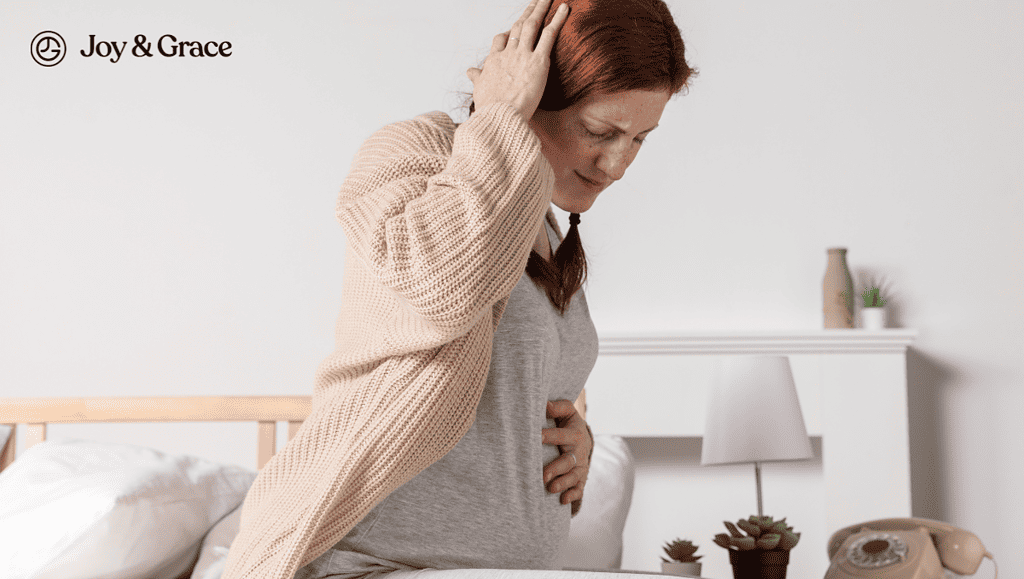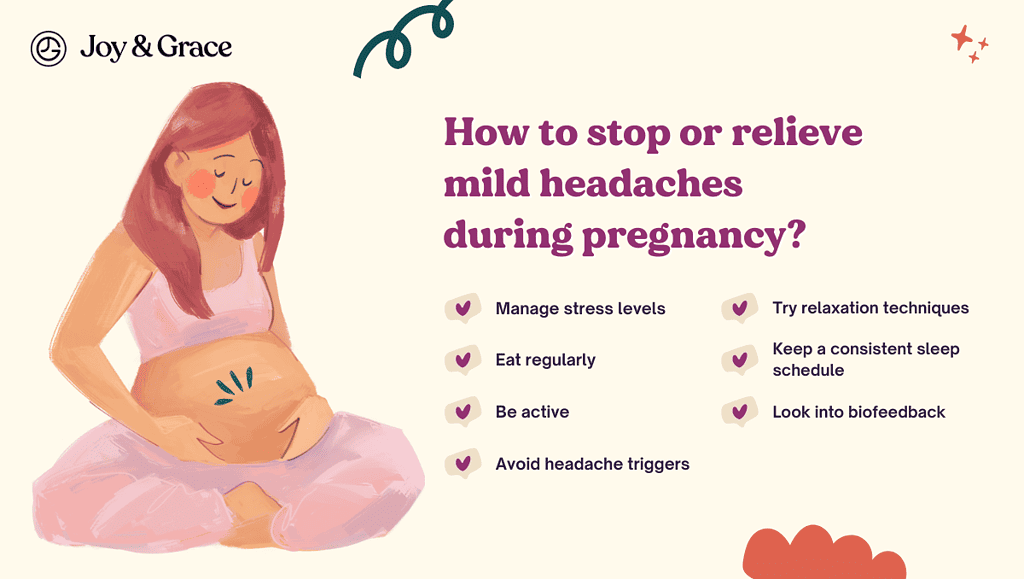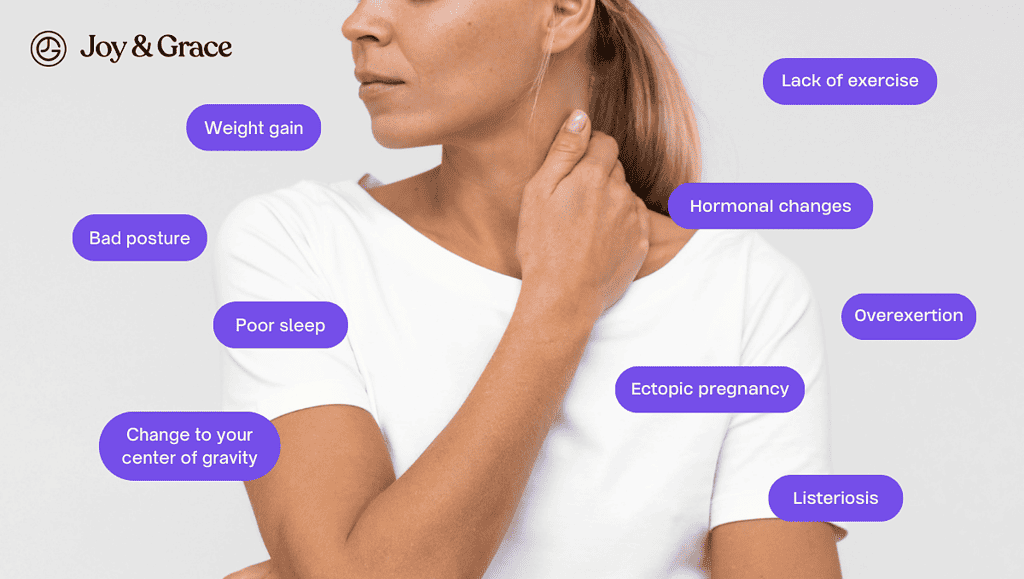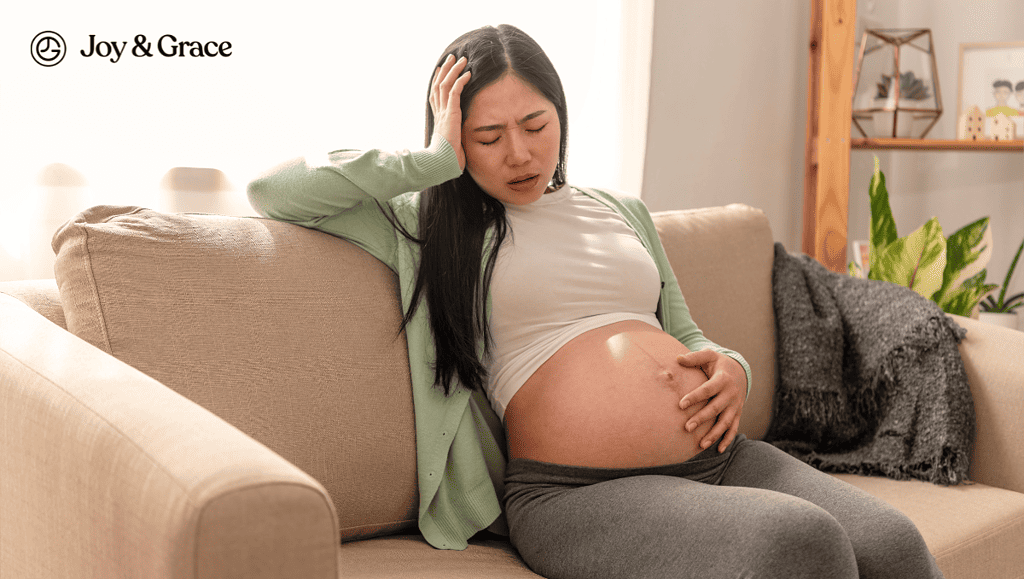Ah, pregnancy. What a time to be alive! You're growing a human inside of you, which is an amazing feat. But pregnancy is no walk in the park! As if all the morning sickness and back pain were not bad enough, headaches and neck pain during pregnancy can be a real bummer and make your day even worse.
In this article, we'll look at why you get head and neck pain during pregnancy, what to do about them, and the things you shouldn't ignore.
What Causes Headaches And Neck Pain During Pregnancy?
The two most common causes of head and neck pain during pregnancy are hormones and increased blood flow. Headaches can be a symptom of low estrogen levels or changes in those levels. When blood vessels in the brain expand to handle increased blood flow, they can press on sensitive nerve endings and cause pain.
Other things that could cause head and neck pain during pregnancy include:
- Lack of sleep
- Low blood sugar levels
- Dehydration
- Caffeine withdrawal
- Stress
- Allergies
- Congested sinuses
- Eye strain
- Poor posture
- Depression
What Does A Pregnancy Headache Feel Like?
Each person may experience headaches differently. You may experience any of the following:
- Pulsating or throbbing pain
- Dull ache
- Extreme pain on one or both sides
- Pain in the back of one or both eyes
Even though you might get a different kind of headache when you're pregnant, most headaches aren't dangerous.
Headaches in the first trimester of pregnancy may be caused by something different than headaches in the second or third trimesters. In some cases, headache pain during pregnancy may be a sign of other health problems.
When Do Pregnancy Headaches Start?

Headaches During the First Trimester
During the first three months of pregnancy, most women get tension headaches. This could happen because your body is going through a lot of changes at this time. Changes in weight and hormones, including higher blood volume, could cause a headache.
Other common causes of headaches during the first trimester include:
- Nausea and vomiting
- Dehydration
- Physical inactivity
- Light sensitivity
- Caffeine withdrawal
- Lack of sleep
- Low blood sugar
- Poor nutrition
- Stress
- Migraines
Certain types of food may also trigger headaches. Some people may get headaches from the following foods:
- Dairy products
- Tomatoes
- Yeast
- Chocolate
Headaches During the Second & Third Trimesters
You may be less likely to experience headaches brought on by hormonal changes in the second and third trimesters of pregnancy since the body has often adapted to these changes by this point in pregnancy.
But some women still get tension headaches during pregnancy because of hormonal changes. In the last few months of pregnancy, headaches are more likely to be caused by:
- Elevated blood pressure
- Gaining excess weight
- Bad posture
- Poor diet
- Bad posture
- Poor sleep
- Hypertension (high blood pressure)
The good news is that they're usually not dangerous and go away after giving birth. The bad news is that they can make you feel like your head is going to explode — and no one wants that!
Common Types of Pregnancy Headaches
It's no secret that pregnancy is a tough time for your body. But did you know that the headaches you get during pregnancy are actually more common than you think? Headaches are divided into two categories based on what causes them: primary and secondary headaches.
- Primary headaches - Usually, headaches during pregnancy are primary headaches. This means that the headache happens on its own and isn't caused by another condition or a problem with the pregnancy. In fact, about 65% of pregnant women experience primary headaches, which are less serious, during pregnancy.
- Secondary headaches - This type of headache happens when something else may be happening during pregnancy. Secondary headaches don't happen as often as primary headaches, but they can be much more serious. According to one study, between 25% and 42% of pregnant women with a secondary headache seek treatment.
Now, here's the thing about pregnancy headaches: they can be very different from one woman to the next. But that doesn't mean you should just ignore them. If you have headaches during pregnancy, it's important to talk to your doctor about what they might be and how they can be treated.
Here are some of the most common types of headaches:
- Tension headache - About 26% of pregnant women experience a tension-type headache at some point during their pregnancy. Tension headaches can produce pressure or a dull ache across the forehead, on both sides of the head, and in the back of the neck. In other words, it can feel like someone is trying to squeeze your skull
- Migraine headache (with or without aura) - This is a common pregnancy headache during the first trimester and can last up to 72 hours. Migraines often happen on one side of your head, can make you sensitive to light and sound, and make you feel sick or throw up.
- Cluster headache - This is the least common of all pregnancy-related headaches and occurs in only about 0.3% of women. Cluster headaches cause severe piercing pain around one eye or temple, often accompanied by tearing or redness of the eye, a stuffy nose, and increased saliva production.
- Sinus headache - Although it's often mistaken as a migraine, it's actually caused by a sinus infection. A sinus headache can be due to pressure around your eyes, cheeks, and forehead, in addition to a stuffy nose. The pain can also get worse when you bend forward or lie down.
- Thunderclap headache - A sudden, severe headache that comes on without warning and usually lasts only a few minutes. It is unknown what causes thunderclap headaches, but they are thought to be due to blood vessel spasms in the brain.
Tips For Relieving Mild Headaches
Most pregnant women can take acetaminophen or Tylenol in liquid form to treat headaches without worrying about harming their babies. Your doctor may also tell you to take other medicines. Make sure your doctor gives you the go-ahead before taking any medicine, including herbal remedies.

But if you don't want to take medicine to stop or relieve mild headaches during pregnancy, you can try the following:
- Manage stress levels - There's no doubt that stress can trigger headaches. So, if you want to avoid them, try to reduce your stress levels as much as possible. Consider opening up your favorite meditation or yoga app or attending a class.
- Eat regularly - Regular mealtimes and a nutritious diet may help reduce the likelihood of headaches. Also, make sure to drink a lot of liquids.
- Be active - Try going for a daily walk or doing something else moderately aerobic.
- Avoid headache triggers - If certain smells or foods have given you headaches before, stay away from them. A headache diary might help you figure out what causes them.
- Try relaxation techniques - You could try deep breathing, yoga, or a massage.
- Keep a consistent sleep schedule - Headaches during pregnancy could be caused by not getting enough sleep.
- Look into biofeedback - By following this mind-body technique, you'll learn how to control some of your body's functions, like muscle tension, blood pressure, and heart rate. This technique may help prevent headaches or lessen their pain during pregnancy. You can ask your healthcare provider to refer you to a biofeedback specialist.
When Should I Be Worried About Headaches During Pregnancy?
Some pregnant women tend to have problems with their blood pressure, which can sometimes lead to headaches. But if your headache is so bad that you can't do the usual things after the 20th week of pregnancy, or if it comes with neck and shoulder pain, nausea, vomiting, or blurred vision, you should call your doctor right away.
Ongoing headaches and neck pain can be a sign of something serious like pre-eclampsia, so if the pain lingers despite over-the-counter remedies and rest, don't hesitate to call your OB/GYN. You may want to consider visiting the ER as well.
Can Pregnancy Cause Neck And Shoulder Pain?
Yes. During pregnancy, the extra weight, changes in hormones, and changes in lifestyle can make it hard to avoid neck and shoulder pain. The pain may feel like stiffness or aching, but it shouldn't be severe or sharp.
First Trimester
Even before you get pregnant, your body makes a hormone called relaxin. Relaxin loosens connective tissues. Relaxin plays multiple roles from the start of your pregnancy until your baby is born. Relaxin helps your body change to support your growing baby, which can cause pain and discomfort in many places, including your neck and shoulders.
Second trimester
As your pregnancy progresses, your body continues to change in many ways. Your baby bump will become more visible in the second trimester, and you may notice changes in your body shape and weight.
These changes affect how you sit, stand, walk, and sleep. In fact, one study found that women in their second trimester walked slower than those who weren't pregnant.
So even though you might not look very pregnant yet, your muscles and the way you carry yourself are changing because of the changes in your body. This can cause aches in your muscles, like neck and shoulder pain.
Third Trimester
Your spine curves out of its normal shape to make room for the growing baby. In one study, researchers looked at the spines of 19 pregnant women in their third trimester and compared them to those of 19 non-pregnant women. The result? They found that the lower part of the spine was more curved in pregnant women during their third trimester.
This makes your spine look more like an "S" as your pregnancy goes on. It helps your body deal with the extra weight of food, baby, and blood, among other things. And when your spine changes during pregnancy, it can affect the alignment of your shoulders and back muscles. These changes may cause shoulder pain or aches.
Neck and shoulder pain are common in the third trimester, so don't worry if you feel achy or stiff. It's just part of pregnancy. Relaxing your shoulder joints and making other changes to posture, sleep patterns, and walking can help.
However, there are also times when neck and shoulder pain during pregnancy could be a sign of something very serious.
Other Causes of Neck and Shoulder Pain in Pregnancy
Meningitis
Meningitis is a type of inflammation that causes swelling in the membranes surrounding the brain and spinal cord. It can be bacterial or viral, and its symptoms can spread all throughout the body.
The symptoms include a stiff neck, a high fever, and bad headaches. When you try to turn your head or bend your neck forward, you might feel like your neck is very stiff.
It could also feel like a deep, throbbing pain that goes from the bottom of your head down to your shoulders or upper back. It may come with a persistent or throbbing headache as well. Ouch!
Consult your doctor right away if you have any of these symptoms. If it’s left untreated, it can be fatal to an unborn child.
Serious Causes Of Shoulder Pain During Pregnancy
Although shoulder pain can come with the usual territory during pregnancy, there are some causes of shoulder pain that are not. Here are more serious causes of pregnancy-related shoulder pain by trimester:
First Trimester
Ectopic Pregnancy
As mentioned earlier, the symptoms of an ectopic pregnancy usually show up between the 4th and 12th weeks. You might have signs of being pregnant before you know it or go to the doctor. This might feel like a strange pain that comes on quickly and is right between your shoulder and arm.
Second and Third Trimesters
Gallstone Formation
In rare cases, gallstones can be a side effect of the hormones that help you conceive and stay pregnant. So if you are pregnant and have pain in your right shoulder, it could mean that you have gallstones. You might not even know you have gallstones, but if one gets stuck in a tube or duct, it can make you feel very sick.
Preeclampsia
This is a very serious condition that causes high blood pressure and other problems during and after pregnancy. Most of the time, pre-eclampsia symptoms like headaches, neck pain, and shoulder pain show up in the second half of pregnancy. Symptoms usually start after week 20, but they can start earlier.
Can Pregnancy Make Your Neck Hurt?
Headaches and backaches seem to be the most common types of pain during pregnancy, but neck pain can be a real problem, too. According to one study, nearly 40% of women visit a massage therapist for neck pain during pregnancy.
Causes of Neck Pain During Pregnancy

Neck pain can happen during pregnancy because your body is going through a lot of changes to support your growing baby. Here's what could be going on:
- Weight gain - When you gain weight, your muscles have to work harder, and your joints, like those in your neck and back, are put under more stress.
- Bad posture - Neck pain can be caused by a sway-back or "U" shape in your spine caused by your growing belly. And you can get neck tension if you slouch over a laptop or sit in a desk chair that isn't good for your posture.
- Poor sleep - Getting a good night's sleep while pregnant is something all too many expecting mothers face, and this could put stress on your neck. If you toss and turn as you try to find a comfortable position, your neck might be stiff and sore when you wake up.
- Change to your center of gravity - During pregnancy, your body's center of gravity constantly changes, and as your uterus expands, it slowly shifts up and forward. Because your body isn't used to this, you'll feel pain in your neck and other discomforts.
- Lack of exercise - When you don't exercise enough during pregnancy, your muscles can become weak and tight. This may lead to straining your neck, resulting in a stiff neck.
- Hormonal changes - Both progesterone and relaxin hormones help loosen joints and ligaments in preparation for birth, making you more likely to have muscle aches and pains.
- Overexertion - Exercise and movement that used to be easy for the body can all of a sudden become too much and cause pain and discomfort. This is one of the main causes of neck pain in early pregnancy.
- Ectopic pregnancy - If you start to feel pain in your neck or where your arm meets your shoulders between 4 and 12 weeks of pregnancy, it could be a sign that the egg is implanted outside of the uterus. This is called an ectopic pregnancy and needs to be treated right away. An ectopic pregnancy can cause serious complications for both you and your baby.
- Listeriosis - Neck pain during pregnancy can also be a symptom of listeriosis, which is a serious food-borne illness that can lead to miscarriage and stillbirth. Listeriosis is rare but can be deadly, so it’s important to rule out any infections or other causes of severe pain in your neck.
If you find yourself dealing with persistent neck pain during pregnancy, it's important not just to treat the symptom but also to consider the cause of your pain. Most likely, there are multiple factors contributing to your discomfort. They can be addressed through a combination of medical approaches and lifestyle changes.
Types of Neck Pain During Pregnancy
While it's easy to assume that all neck pain during pregnancy is related to the weight of your growing belly, there are actually several different types of neck pain during pregnancy. It could be due to any of the following:
- Pinched nerve - A pinched spinal nerve can cause pain in your neck. This pain can be sharp or feel like pins and needles, and it can spread to your arms and hands.
- Headache - The pain you feel at the back of your head could radiate down into your neck.
- Neck spasm - If you wake up with a tight or stiff neck, it could be a spasm, which happens when your neck muscles tighten involuntarily. This could happen if you sleep with your neck in an awkward position.
- Neck injury - Your neck can be yanked back and forth by falling, tripping, or coming to a quick stop in the car, which sometimes results in whiplash.
- Muscle strain - Sore muscles can be caused by overusing your muscles or staying in one position for too long. Possible causes include slouching over a computer keyboard, reading in an awkward position, or even clenching or grinding your teeth.
- Referred pain - Pain in another part of your body could be the cause of your neck pain.
What Can I Do For Neck Pain While Pregnant?
If you have neck pain during pregnancy, don't worry! It's totally normal, and you can do some simple things to improve it.
For starters, you can start by taking a good look at your posture and how you're carrying yourself. Are you slouching? Are your shoulders up around your ears? That's not ideal for anyone, especially during pregnancy.
Here are some more tips to help:
- Keep a good posture - To ease neck pain and promote spinal alignment, focus on sitting up straight: keep your shoulders back while relaxing the muscles in your lower back.
- Use the right pillow - Avoid using hard and uncomfortable pillows. To get a better night's sleep, consider using a pregnancy pillow to give you more support for your head, neck, and shoulder.
- Daily gentle stretching - If you stretch regularly during your pregnancy, your muscles will be better prepared for the physical stress of motherhood.
- Get into prenatal yoga - Yoga for pregnant women is a great way to relax the neck and shoulders. It gives you a healthy way to move, lets you focus on your breathing, and makes you more flexible.
- Hot and cold showers - Hot water can help improve blood circulation and relieves stiff and tensed-up muscles. Cold water, on the other hand, works to reduce inflammation and soothes the joints and muscles.
- Stay active - Muscle pain and stiffness, especially in your neck and shoulders, can happen if you stay in one place for a long time. Exercise and pregnancy-safe workouts can help relieve stress, stretch your muscles, and relax the body.
- Give the tennis ball trick a shot - Put a tennis ball where your shoulders, neck, and upper back meet. Gently move the ball around on sore spots, or you could also position the ball between your body and a wall.
- Get a massage - It doesn't matter who does it for you (your partner, friend, family member, or even a professional). Massages can make the muscles and tissues in your head, neck, and shoulders feel less tight.
If you tried all of the above and still didn't feel any relief, or if it's getting worse, try discussing it with your doctor to see if they have any other ideas.
Takeaway
If you're pregnant and having headaches and neck pain, don't panic! These symptoms are common in pregnancy. Even though headaches and neck pain are common, severe pain can sometimes mean something is wrong.
You should see a healthcare provider immediately if you have pain much worse than a typical headache or stiff neck. While it may be nothing serious, there’s a possibility that it is a symptom of a larger issue with the pregnancy.
We hope this guide has given you the information you need to manage headaches and neck pain during pregnancy.
Need a little extra warmth around your neck? Our warm and soothing neck wrap is just what you need to help relieve the pain. Its relaxing herbal scents will help you feel better, and its heat will help relax your muscles and relieve tension. It’s the perfect accessory for any mom-to-be!














